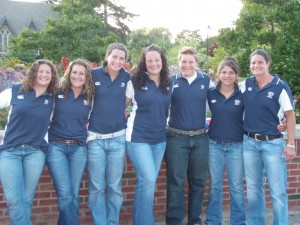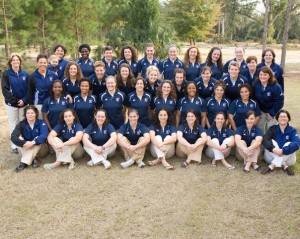
The Boston Women's Rugby Team will be participating in this year's World Cup, which will take place in England from August 7-September 5. Photo of the team from a recent three week training program at Bowdoin College in Brunswick, Maine
By Mike Rubin
Off the field Jamie Burke is kind and gentle. On the rugby gridiron, she’s emerged as one of the fiercest competitors in the sport.
After years of training, Burke – a Somerville resident – heads to England to participate in this year’s Women’s Rugby World Cup.
Slated to kick off last Saturday, the United States National team will serve as one of 12 teams throughout the globe.
Burke competes for Beantown, an area Women’s Premier League team, whose season runs from the end of August until November. Consisting of eight teams around the country, including Washington D.C., St. Paul, Minnesota and Berkeley, California, the Beantown squad finished third in the country last year and is aspiring for even loftier aspirations next.
First, Burke and the National squad plan on taking care of business in this year’s World Cup competition. Despite the relatively youthful team, Burke is optimistic of her team’s chances.
“This team that is going to the World Cup is relatively young as a result of a number of retirements that happened following the 2006 World Cup,” said Burke.
On the current team, there are nine players who were at the 2006 World Cup, and 15 making World Cup debuts. 
“Since the 2006 World Cup, we have played 16 matches with 14 of those against Canada and England and the other two against South Africa and France. This means that we are coming into the tournament with relatively little international experience compared to some of the European rugby powerhouses who can have 16 matches in a year.”
Formed in 1987, the USA Women’s National team developed as one of the first nations to play women’s rugby. Since its inception, the Women Eagles have managed to compete among the highest level of competition throughout the world. In 1991, the Eagles captured the first official Rugby Women’s Cup in 1991 while finishing second in 1994 and 1998. Since 2002, the United States haven’t earned the same amount of success, but did manage a 4-1 mark in 2006.
While Burke has developed into one of the finest rugby athletes in the nation, she, as well as her teammates must still balance work and school. As a result, the majority of the squad will have to take unpaid leaves from their jobs.
“We play elite level rugby, but because the sport is not well recognized or supported, we also work full time as teachers, students, geophysicists, and non-profit organizers,” said Burke, who’s earning her PHD at the University of New Hampshire and works part time as a Red Cross Instructor. “So we have to do all the training, practicing, conditioning required of that level of athleticism on top of working full-time or in the early mornings. All of us train many hours in the gym, at the track, on the field to make sure we are in shape for competing at the highest possible level.”
With the majority of the team residing in the Boston area, the squad has trained together and generated workout programs in preparation for the World Cup.
“One benefit for those of us in the Boston area is that there are several of us who live here and so we can work together and keep each other motivated when training gets tough. I live in Somerville. One teammate lives in Norwood and another in Jamaica Plain, and then another four live in Watertown.”
Prior to the World Cup, the Eagles endured a rigorous three week training schedule at Bowdoin College in Brunswick, Maine.
“One of the limitations of playing for the national team in this country is that it is hard to have enough practice time together because everyone is so geographically spread out,” said Burke. “Whereas smaller countries like England or Scotland can have team gatherings relatively easily because they aren’t so spread out, there is a great deal of time and travel required for our entire team to be together. So having the opportunity to train together uninterrupted for three weeks was great and I think will contribute hugely to success at the World Cup.”
For funding, the team has managed to generate some sponsorships, but still has to maintain tireless efforts through fund raising.
“The team does have some sponsors that cover basic costs and uniforms and such, but there is also a great deal of the fund raising happening as well through our team website – www.wewantrugby.org,” said Burke. “A huge part of this fund raising has been undertaken in order for us to be able to receive a small stipend for playing. The men have been receiving a per diem for many years, but this is the first time since I started playing for the National Team (in 2004) that the women have are receiving any sort of compensation. Prior to this, each of us would take time off from work (in many cases unpaid) and hope that in the months leading up to an event we could save up enough money to pay bills and rent while away or count on credit cards to try and cover expenses. So to have even a small per diem is a huge step in the right direction. It is not enough to be a full salary, as it only covers those days that we are actually away, but it helps to offset bills and rent that pile up while we are out of the country. Obviously it would be great if we could become a fully professional sport, but at this point we are taking each small victory.”
While the Eagles aren’t considered one of the favorites to challenge for the World Cup, Burke and the squad are certainly relishing in the underdog role.
“I think we have very good chances at this World Cup,” said Burke. “Our youth and relative lack of experience in the past four years may cause some of the bigger rugby countries to look past us, which will be to their detriment because we thrive on being the underdog.”












Reader Comments